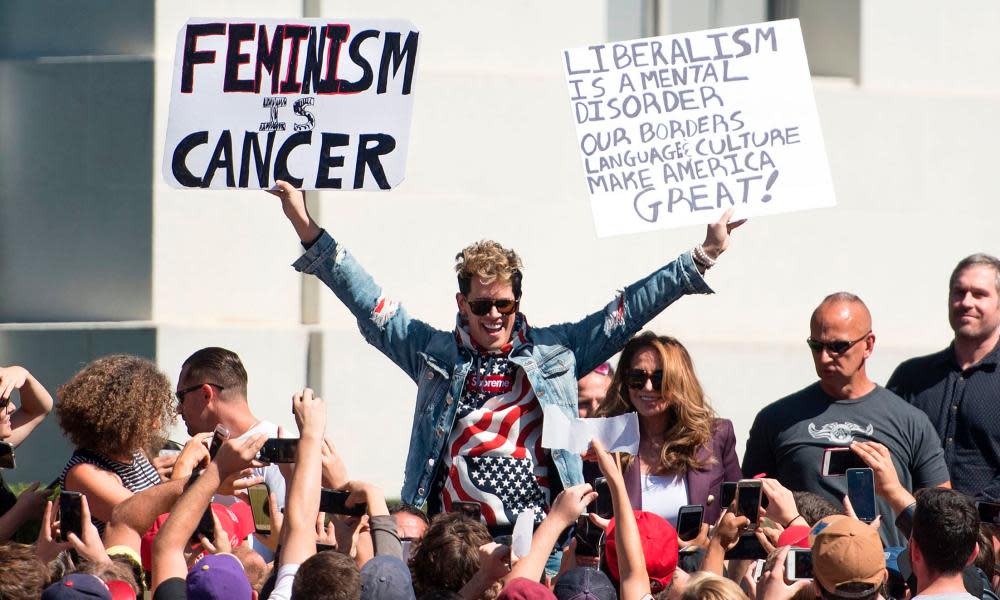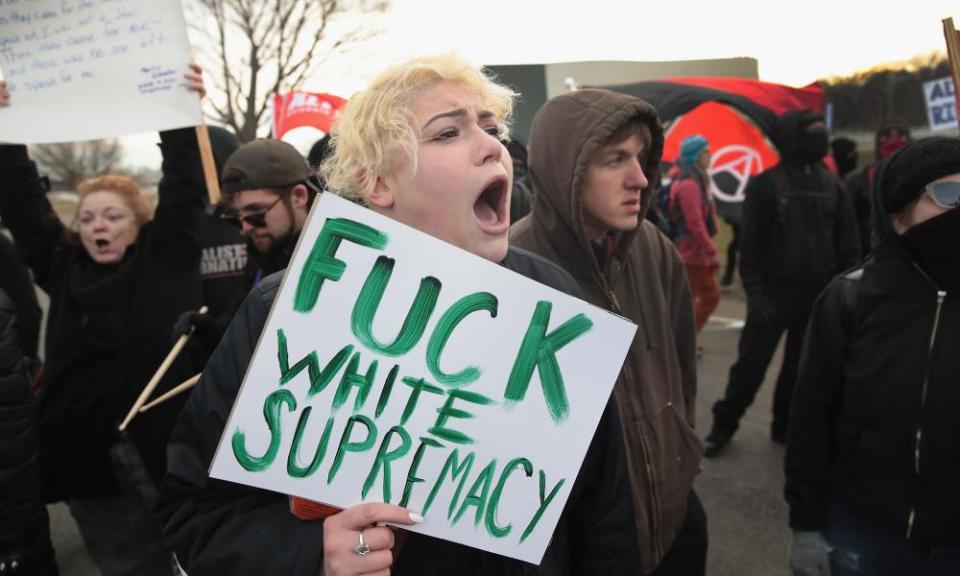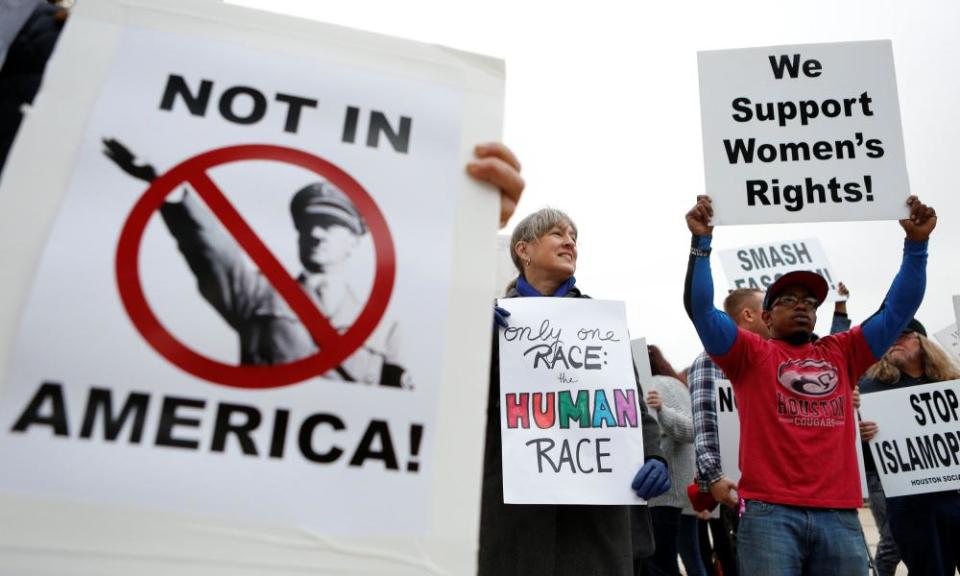How to troll the left: understanding the rightwing outrage machine

How do you make a speech at a provincial liberal arts college into national news? As it turns out, the basic requirements are simple: a shareable video, provocation and persistence.
For the past few months, this recipe was developed and fine-tuned in a series of speeches at Portland-area universities featuring controversial speakers. All have involved a small group of Portland State University students and faculty associated with an atheist student club.
Their efforts reveal the mechanics of a movement that energetically denies that it is rightwing, but works hand in hand with rightwing media and rightwing organizations to promote attacks on progressives.
The most recent example took place in Lewis and Clark College in Portland. The college became the unlikely focus of a national media cycle when the American Enterprise Institute scholar, self-styled “factual feminist” and Gamergate muse Christina Hoff Sommers was booed and interrupted by some students.
Sommers was there to give a speech to the university’s Federalist Society, covering her familiar criticisms of contemporary feminism and identity politics. In advance of her visit, some left student groups had demanded that the invitation be rescinded. Their letter hyperbolically described Sommers as a “known fascist”. Also, following the lead of a recent article by the Southern Poverty Law Center, they associated her with “male supremacy”.
In the days that followed, the event – which was filmed – was the subject of dozens of articles in rightwing media, where it was used as yet more evidence of a “free speech crisis” and the decline of “Enlightenment values”.
And then it came to the attention of op-ed writers at the New York Times.
After characterizing it as a 21st-century auto-da-fé on Twitter, op-ed writer Bari Weiss first argued it was evidence of an out of control PC culture on campus. A few days after, her colleague David Brooks did some trademark tutting over the incident and the students’ “mobbist” mindset.
Finally, Weiss appeared on Bill Maher’s talkshow, where the host nodded along with her complaints about those criticizing her on social media for departing from “woke orthodoxy”.
The perfect videos for the rightwing outrage machine
The widely circulated video that underpinned all coverage was captured and tweeted out by a Portland State University graduate student in politics, Andy Ngo. Ngo describes himself as a journalist, and his work has appeared almost exclusively in hyper-partisan conservative outlets like The College Fix. There was no media accreditation, but Ngo captured cellphone video, and this became the unchallenged record of the event.
Ngo is no stranger to controversy, and it wasn’t his first viral video. Over the last year, the student has shrewdly inserted several into the workings of the rightwing outrage machine.

An earlier moment of prominence on the right led to his departure as an editor of PSU’s student newspaper, Vanguard. Last April, Ngo tweeted out a fragment of video from an interfaith panel at the college. It showed a Muslim student saying that “apostates will be killed or banished in an Islamic state”. The footage was picked up by a far-right news site, Breitbart, and led to a social media firestorm.
The video was exactly the kind of material that has been Breitbart’s bread and butter since the college tours of its former tech editor, Milo Yiannopoulos: on-campus exposés of PC or identity politics, served up to inflame its rightwing populist and “alt-right” readers.
Vanguard let Ngo go, explaining their decision by saying that his video had been “published and shared without context in a way that placed a PSU student in significant danger”, and that he had misrepresented the student and the panel.
Who coined the term 'alt-right'?
The white supremacist Richard Spencer devised the term in 2010. He has described the movement as "identity politics for white Americans and for Europeans around the world".
What does it stand for?
The movement supports extreme rightwing ideologies, including white nationalism – used interchangeably with white supremacism – and antisemitism. It positions itself broadly against egalitarianism, democracy, universalism and multiculturalism.
Some "alt-right" supporters have argued that their hardline, extremist positions are not truly meant, but are a way to disrupt conventional and accepted thinking. Memes, irony and ambiguity are sometimes used in an attempt to wrongfoot critics.
How does the 'alt-right' relate to the Trump administration?
The Trump administration includes figures who are associated with the "alt-right", including the former Breitbart News executive chairman Steve Bannon, now the White House chief strategist. Many of Trump's policy positions have won favour with the movement.
When Vanguard, too, became the focus of conservative ire, it published another blogpost offering further explanation.
As a result of his dismissal, Ngo got space on a major conservative platform, National Review, which he used to frame his dismissal as a free speech issue. He also did an “ask me anything” session on the subreddit r/thedonald, a major hub for Trump supporters, conspiracy theorists, and far-right sympathizers. There, he described his firing as part of a “trend towards self-censorship in the name of political correctness”, expressing a desire to appear on the show of Fox’s prime-time race hustler, Tucker Carlson.
In February, another Ngo video did the rounds of rightwing media. It depicted another brief disruption of an event, this one hosted by Freethinkers of PSU, an atheist student club led by Ngo. The headliner was the fired Google engineer and author of an infamous memo on diversity at the company, James Damore.
In the lead-up to Damore’s appearance, Ngo penned an article for the Wall Street Journal alleging that the event had been threatened, writing that that “we expected controversy. But we also got danger.” The evidence of danger, as reported in Willamette Week, was “two violent threats on Facebook, three diversity events held on campus as counter-programming, and a scornful blog post”.
This was more than enough for Fox News, who ran an item under the headline “Antifa targets ‘Google memo’ author James Damore’s talk at Portland State”.
Despite the headline, Portland’s Rose City Antifa told the Guardian ahead of time that no antifascist counterprotest was ever planned, and none materialized. There was only a small audience walkout.
Nevertheless, along with spreading the video, Ngo wrung from the evening an article for Quillette, a website obsessed with the alleged war on free speech on campus. The event was also given lavish attention by the YouTube star Tim Pool, who insists that he is not “alt-right”, despite his apparent chumminess with the movement’s leading lights.

Events perfectly tailored to push progressives’ buttons
Along with Damore, the February event featured other hot button speakers who seemed calculated to provoke Portland’s progressive activists.
They included Bret Weinstein and Heather Heying, a husband and wife pair of biologists who acrimoniously left Evergreen State College, in Olympia, Washington, last September.
Weinstein became the center of student protests – and the toast of rightwing media – after challenging a campus “Day of Absence”, where white faculty and staff were encouraged to attend off-campus events. His claims of reverse racism were taken up by many, including the ever-reliable Tucker Carlson, as a parable of the excesses of campus politics. To little avail, his former colleagues have tried to point out how simplistic his version of events is.
Since leaving Evergreen with a substantial settlement, the pair have continued their media and speaking blitz, and have solicited funds from their social media following. Weinstein insists that he is a progressive, but his biggest megaphones have been provided by the right.
Joining them was Peter Boghossian, a Portland State University (PSU) assistant professor of philosophy. Boghossian has had some prior notices as a new atheist activist – he and some students even designed an atheism themed app, and he is listed as a speaker for the Richard Dawkins Foundation. Ngo calls him an “unofficial mentor” to the Freethinkers.
People are hungry for these conversations, but they’re held hostage by the reigning moral orthodoxy
Peter Boghossian
In recent months, Boghossian has pivoted to poking the PC left in the manner of Jordan Peterson. He has appeared at several other events, including: “The New Campus Thought police”, “Is intersectionality a religion?” and “Victims, victims, everywhere”. These events highlighted contributions by Sommers, Weinstein, Heying, and “classical liberal” talkshow host Dave Rubin. Last year, when Rubin hosted Boghossian on his talkshow, he spent the opening minutes defending himself from Mother Jones that he was “far right”.
The last two events were co-hosted by the PSU College Republicans and the local chapter of Turning Point USA (TPUSA), a growing national rightwing student group. They have carried out a range of stunts on campuses across the country, and curate a “watchlist” of leftwing professors. Last month, the Southern Policy Law Center detailed what it called its “blooming romance” with the “alt-right”. Some writers, pointing to their on-campus harassment, have likened them to “young fascists”.
Ngo denies any association with these groups or the events they organised, but Freethinkers are linked to TPUSA through an officer, Reece Betcher. Until last August, he was TPUSA’S PSU chapter president. He told the Guardian: “I still am on good terms with TPUSA and I support their PSU chapter. He also says he helped organize their most recent event.
‘Diversity is a Trojan horse for a political agenda’
When asked if this coterie’s events constitute a pattern of provocation, Boghossian insists it is not. “People are hungry for these conversations, but they’re held hostage by the reigning moral orthodoxy.”
Ngo also rejects the idea of provocation. Of his organizing and videos, he says “it was not a plan to get national attention for myself”.
Others disagree. Karis Sponsler is part of Women in Computer Science PSU, which organized peaceful, alternative counter-events to the Damore panel, focused on career development for women computer scientists.

She says her events got a good response on campus, but received next to no coverage, let alone a mention in the New York Times: they were not spectacular enough to play into ruling narratives about campus politics. She believes that all of the recent events were designed to provoke the on-campus left.
Boghossian said they had “invited the whole women’s studies department at PSU to come on stage with just James Damore and myself” for the purposes of debate.
Professor Sally McWilliams, PSU’s department chair of women, gender and sexuality studies, confirmed that had emailed her, but that “we all decided that the so-called dialogue format wouldn’t actually function as a forum for civil and productive discussion”.
Boghossian does seem to see members of her discipline in a dark hue. At the Damore event, he said that “diversity is a Trojan horse for a political agenda.”
When asked later what was inside the Trojan horse, he said “the diversity they try to create is the most superficial kind of diversity and doesn’t include ideological diversity.”
When asked who “they” were, Boghossian replies “all disciplines infected by postmodernism, and women’s studies and gender studies in particular.
“It’s intersectionality, it’s diversity, it’s those values which are riding in the wake of postmodernity,” he added.
“Jordan Peterson speaks about this, Gad Saad speaks about this, Steven Pinker speaks about this, there’s a whole circle of us speaking about this.”
Despite his criticisms of the campus left, however, Boghossian insists that he is not rightwing, that he “can’t stand Republicans”, and complains about recent accusations that he is “alt-right”. He insists it’s all about Enlightenment values.
Ngo too. “I identify as a centrist if I was forced to answer”, he writes, adding that “Freethinkers is a nonpartisan organization”.
Strange, then, that they, and the movement that Boghossian claims membership of, take such trouble over antagonizing the left, and drawing rightwing attention.

 Yahoo News
Yahoo News 
